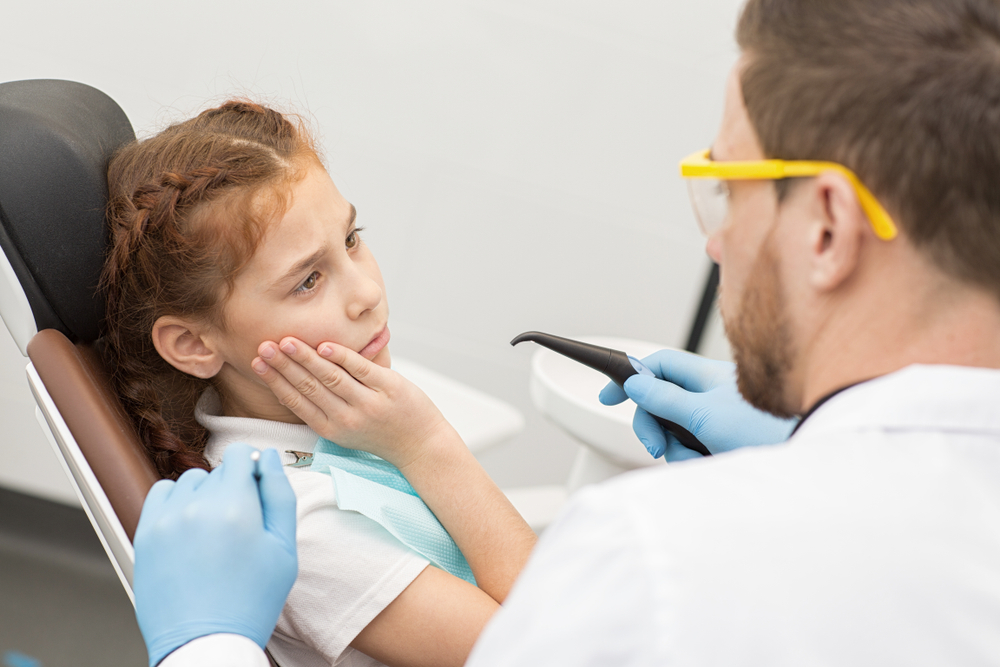
Table of Contents
Common Children’s Dental Emergencies
Kids are always on the move and from a knocked out baby tooth to a chipped or fractured permanent tooth, sometimes, dental emergencies happen. Thankfully, when they do occur, with some quick thinking and action, children’s teeth can often be saved. To help you preserve your child’s smile in case of an injury or other concern, our Naperville pediatric dentists are sharing tips for handling common children’s dental emergencies.

Key Highlights:
- When kids have a dental emergency, quick thinking is key!
- A knocked out tooth in kids or a tooth that’s been shifted out of place may be able to be saved if you visit a dentist right away.
- For more severe injuries like a broken jaw or uncontrollable bleeding, go to the emergency room.
- Knowing how to handle issues like toothaches in children or cuts to the lip or tongue can help your kiddo be comfortable until their dental appointment.
What to do When a Child has a Knocked Out Tooth
Knowing what to do when a child has a knocked out tooth is key because if it’s addressed quickly, a knocked out permanent tooth may be able to be reimplanted. If your child’s permanent tooth is knocked out:
- Control any bleeding. If you can’t control the bleeding, take your child to the emergency room.
- Try to find the tooth. If you do spot it, pick it up, being careful not to touch the tooth’s root. Gently rinse away any debris with water if it’s dirty. Don’t scrub it or use soap.
- When the tooth is clean, gently reinsert it into the socket so that it’s facing the correct way (only if it’s a permanent tooth; don’t reinsert a baby tooth). Use your thumb to press down on the tooth so that’s level with the tooth next to it.
- Have your child bite down on a piece of cloth or gauze to hold the tooth in place until you get to the dentist. Since reimplanting the tooth is most successful within an hour, call your dentist as soon as possible.
- If you can’t get the permanent tooth back into the socket, keep it moist until you see the dentist. You can store the tooth in a container of cold milk. Or, if your child is older and not at risk of swallowing the tooth, have them keep it in their mouth. If neither of these are a possibility, transport the tooth to the dentist wrapped in a wet cloth.
- If you can’t find the tooth at all, it’s still essential to see the dentist. Depending on the injury, the tooth, whether a permanent or primary tooth, could have been knocked up into the gums.
For primary teeth, while you don’t want to attempt to reimplant it and you won’t need to keep it moist, if you can find it, bring it to your dental appointment. It may not seem like a big deal when an infant or a toddler has a knocked out baby tooth since they would eventually lose the tooth anyway. However, the other teeth will shift to fill in the space, which can lead to crowding and orthodontic issues. In order to prevent this, when a baby tooth is knocked out, your child may need a space maintainer to save room for the permanent tooth to erupt properly.
What to do When a Permanent or Baby Tooth is Knocked Out of Position
If a child falls, they can experience a tooth knocked out of position that is still in its socket. When a permanent or baby tooth is knocked of place:
- Control any bleeding and if you can’t, go to the emergency room as soon as possible.
- Very carefully push the tooth back into place.
- Have your child gently bite on gauze or a cloth to hold the tooth in position until you can get to the dentist.
- See a dentist as soon as possible. The sooner you visit the dentist, the greater chance there is that the tooth can be saved.
What to do for a Chipped or Fractured Tooth in Kids
Thankfully, a chipped tooth in kids is treatable. For a minor chipped tooth, a tooth-colored filling or dental bonding can seamlessly restore the tooth. For a seriously damaged tooth, a dental crown might be necessary. Even in the case of a chipped baby tooth, it’s important to take action and visit the dentist. To deal with a chipped or fractured tooth in kids:
- Again, control any bleeding and if you’re unable to, visit the emergency room.
- Have your child rinse their mouth out with warm water. Make sure they don’t have any tooth fragments in their mouth that they could accidentally swallow.
- If you’re able to locate the tooth fragments, bring them with you to your dental appointment.
- For a large chip or fracture, or if the tooth is loose, shifted out of place or your child is in pain, visit the dentist as soon as possible.
- Place a cold compress on your child’s cheek in the area of the injury and have them hold it in place on your way to the dentist.
How to Handle a Child’s Toothache
If your child has a toothache, first, have them rinse their mouth out with warm water. Then, gently floss to remove any debris or food that could be caught in the area and causing pain. If the tooth still hurts, call your Naperville pediatric dentist to make an appointment. While there is a myth that putting aspirin on a tooth and gums can relieve a toothache, it’s not a good idea and can actually burn the gum tissue.
Instead, giving your child an over-the-counter pain reliever can be helpful for alleviating tooth pain until you’re able to get to the office. If your child has facial swelling and severe tooth pain, this could be a sign of infection, which, if not treated promptly, could spread. Therefore, it’s important to call the dentist right away. Place a cold compress on your child’s face to help with swelling in the meantime.
How to Treat Injuries to a Child’s Cheeks, Lips or Tongue
If your child bites their lip or tongue or sustains an injury to the soft tissues of their mouth:
- Have your little one rinse their mouth out with warm water so you can assess the injury.
- Apply pressure with a clean cloth or piece of gauze to stop any bleeding.
- If there’s swelling, have them hold an ice pack or cold compress wrapped in a towel to the cheek or lip.
- If the bleeding doesn’t stop or you think your child may need stitches, seek medical attention.
What to do if You Think Your Child has a Broken Jaw
If you think your child has a broken jaw, it’s important to get medical care right away. A blow powerful enough to break a child’s jaw could also cause a concussion, so they’ll need to be evaluated. Apply a cold compress to the jaw to control swelling while you go to the emergency room.
Following these steps can help you handle the common dental emergencies in children. The most important thing is to remain calm and act quickly. If you’re looking for a knowledgeable, friendly Naperville pediatric dentist for your child, emergency or not, schedule a visit at Innovative Pediatric Dentistry today by calling us at (630) 848-PEDO.

